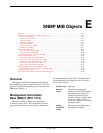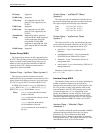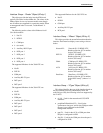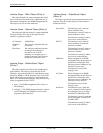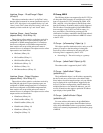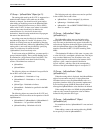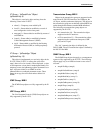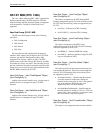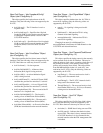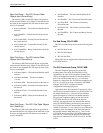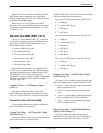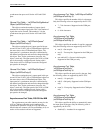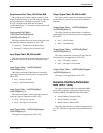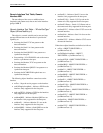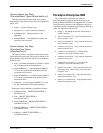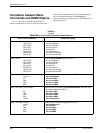
SNMP MIB Objects
E-93360-A2-GB20-20 December 1996
Near End Group – “dsx1LoopbackConfig”
Object (dsx1ConfigEntry 9)
This object specifies the loopback state of the E1
interfaces. Only the following values are supported by the
E1 NTU.
• dsx1NoLoop(1) – The E1 interface is not in a
loopback state.
• dsx1PayloadLoop(2) – Specifies that a Payload
Loopback (PLB) is active for the network interface
or a Repeater Loopback (RLB) is active for the
G.703 DTE interface.
• dsx1LineLoop(3) – Specifies that a Line Loopback
(LLB) is active for the network interface or a DTE
Loopback (DLB) is active for the G.703 DTE
interface.
Near End Group – “dsx1LineStatus” Object
(dsx1ConfigEntry 10)
This object specifies the line (alarm) status of the E1
interfaces. Only the following values are supported by the
E1 NTU. More than one value may be active at a time.
• dsx1NoAlarm(1) – No alarm present.
• dsx1RcvFarEndLOF(2) – A Remote Alarm
Indication (RAI) signal is being received.
• dsx1RcvAIS(8) – An Alarm Indication Signal
(AIS) is being received.
• dsx1LossOfFrame(32) – An Out Of Frame (OOF)
condition has persisted for more that 2.5 seconds.
• dsx1LossOfSignal(64) – A Loss of Signal (LOS)
condition has persisted for more that 2.5 seconds.
• dsx1LoopbackState(128) – The near end of the E1
interface is in a loopback state.
• dsx1RcvFarEndLOMF(512) – The far end is
sending a Loss of MultiFrame Failure (RMA).
• dsx1XmtFarEndLOMF(1024) – The near end is
sending a Loss of MultiFrame Failure (MFA).
• dsx1Other Failure(4096) – An Excessive Error Rate
(EER) has been detected on the network interface.
Near End Group – “dsx1SignalMode” Object
(dsx1ConfigEntry 11)
This object specifies whether time-slot 16 (TS16) is
reserved for signaling. Only the following values are
supported by the E1 NTU.
• none(1) – No signaling is being used on this
interface.
• bitOriented(3) – Indicates that TS16 is using
Channel-Associated Signaling.
• messageOriented(4) – Indicates that TS16 is
reserved for signaling.
Changing from none(1) to bitOriented(3) or
messageOriented(4) deallocates all DS0 channels on the
G.703 DTE and network interfaces.
Near End Group – “dsx1TransmitClockSource”
Object (dsx1ConfigEntry 12)
This object specifies the timing source for the currently
active transmit clock for this E1 interface. This may be
either the primary clock source, secondary clock source (if
the primary has failed), or the internal clock (if both
primary and secondary have failed). This object differs
from the MIB definition in that it is “read-only” (not
read/write) for E1 NTUs. Only the following values are
supported by the E1 NTU.
• loopTiming(1) – The recovered receive clock is
being used as the transmit clock.
• localTiming(2) – The E1 NTU’s internal clock is
being used as the transmit clock.
• ThroughTiming(3) – The recovered receive clock
from another interface (e.g., E1, Port, or External)
is being used as the transmit clock.
Near End Group – “dsx1Fdl” Object
(dsx1ConfigEntry 13)
This object specifies how Facility Data Link is being
used. Only the following values are supported by the
E1 NTU. More than one value may be active at a time.
• dsx1other(1) – SNMP data is being sent over FDL.
• dsx1Fdl-none(8) – Indicates that the device does
not use FDL. This value is always returned for the
G.703 DTE interface. It is also returned for the
network interface when the FDL management link
is disabled.



